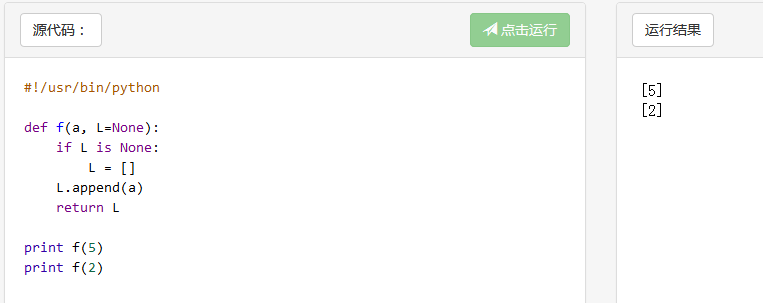1 def f(a, L=[]): 2 L.append(a) 3 return L 4 5 print f(5) 6 print f(2)
输出

1 def f(a, L=None): 2 if L is None: 3 L = [] 4 L.append(a) 5 return L 6 7 print f1(5) 8 print f1(2)
输出

上面两个函数的区别,f()输出的结果是累加的,f1()输出的结果是独立的
If you don’t want the default to be shared between subsequent calls -> 用f1()
4.7.2. Keyword Arguments
def parrot(voltage, state='a stiff', action='voom', type='Norwegian Blue'): print("-- This parrot wouldn't", action, end=' ') print("if you put", voltage, "volts through it.") print("-- Lovely plumage, the", type) print("-- It's", state, "!") parrot(1000) # 1 positional argument parrot(voltage=1000) # 1 keyword argument parrot(voltage=1000000, action='VOOOOOM') # 2 keyword arguments parrot(action='VOOOOOM', voltage=1000000) # 2 keyword arguments parrot('a million', 'bereft of life', 'jump') # 3 positional arguments parrot('a thousand', state='pushing up the daisies') # 1 positional, 1 keyword
# 异常情况,下面几种情况运行都不成功
parrot() # required argument missing ,必须有个必填参数
parrot(voltage=5.0, 'dead') # non-keyword argument after a keyword argument ,这个当我把第二个参数换成status='dead'时运行成功。我的理解是前面参数用了参数名,后面就必须得跟,要是前面没跟,那后面跟不跟都可以
parrot(110, voltage=220) # duplicate value for the same argument,重复传参
parrot(actor='John Cleese') # unknown keyword argument #参数typo
输出 
解析
传值时,带变量voltage=1000,运行时会自动匹配到对应的位置
不带变量parrot('a million', 'bereft of life', 'jump') ,则按顺序传参
定义函数有 *name和 **name时, *name 必须在 **name之前。
1 def cheeseshop(kind, *arguments, **keywords): 2 print("-- Do you have any", kind, "?") 3 print("-- I'm sorry, we're all out of", kind) 4 for arg in arguments: 5 print(arg) 6 print("-" * 40) 7 for kw in keywords: 8 print(kw, ":", keywords[kw]) 9 10 cheeseshop("Limburger", "It's very runny, sir.", 11 "It's really very, VERY runny, sir.", 12 shopkeeper="Michael Palin", 13 client="John Cleese", 14 sketch="Cheese Shop Sketch") 15 16 # 输出结果 17 -- Do you have any Limburger ? 18 -- I'm sorry, we're all out of Limburger 19 It's very runny, sir. 20 It's really very, VERY runny, sir. 21 ---------------------------------------- 22 shopkeeper : Michael Palin 23 client : John Cleese 24 sketch : Cheese Shop Sketch